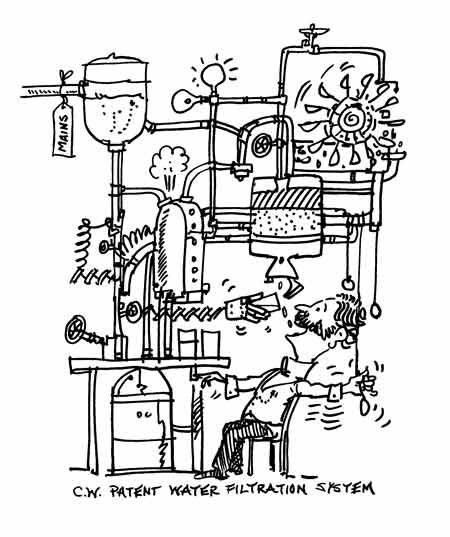|
|
Healthy water Sarah Merson reviews the case for water filtration and, if you decide to filter your water, how you might go about it. |
|
We all know about the importance of a healthy diet, yet the simplest element of all, pure drinking water, is often overlooked. Most of us are used to turning the tap on without giving a thought to what the water coming out of it might, or might not contain, and how it affects us. The truth is, the water we are drinking could be making all the difference between good and poor health. Whilst tap water is regularly tested by local water companies, which in turn are monitored by a Government watchdog (in the UK the Drinking Water Inspectorate) the presence of harmful bacteria, pesticides and detergents have caused a series of scares. Whilst these cases may be isolated, concerns remain, not only over what is or is not removed from our drinking water, but over the processes and chemicals used in water treatment. Chlorine is the prime-disinfecting agent used in the processing of tap water but studies have linked chlorine to an increased risk of bladder and rectal cancer, and birth defects such as spina bifida. However, depending on the quality of the input water and the latest technologies, a variety of other chemicals, additives and processes are used including aluminium sulphate, fluoride and chemical coagulation (which binds together fine particles). Concerns over the use of aluminium in water processing have been raised while there is a significant body of scientific literature connecting fluoride to a huge swathe of health problems from reduced bone strength to renal failure, birth defects, cancer and tooth decay. See www.fluoridation.com and a host of other related websites. The argument rages throughout the developed world where many governments are enforcing the use of fluoride in public water supplies on the grounds that it is good for our teeth. There is also concern over what our water comes into contact with after it has left the treatment plant on its journey to our taps,. For instance, the quality of the pipework that carries the water, accidental discharges and leaching have all caused problems in the past. Your local Consumer Council for water companies listed in your telephone directory under ‘consumer organisation’ Water filtration – the way forward?With the increased concern over water quality, or lack of it, in our drinking water, water filtration systems have become widely recognised for their ability to remove chlorine, lead and other contaminants. Certainly for those who are sensitive to chemicals, heavy metals or other possible contaminants, the quest for water that is truly pure and health-giving, is an important, if not vital one. Before purchasing a filtration system though, it’s worth having your water evaluated as different regions have different supplies, and depending on the levels of chlorine, lead or micro-organisms present, certain filtration systems may be preferable. Measuring ‘pure’ water ‘It would be a mistake to believe that water with a very low or even zero TDS rating is an indication that the water is better, warns nutritionist and author of Healthy water for a longer life, Dr Martin Fox who believes that we should drinking hard water with an alkaline pH level and around 300 mg/l TDS, which includes the minerals calcium and magnesium needed by the body. Choosing a water filtration system Below is a very abbreviated version of their guide to filtration systems:
Three UK suppliers: Brita jug water filter. The filter taps have a Pearl cartridge, which has a ceramic outer shell and an inner core of extruded carbon. The ceramic removes contaminants, which may include bacteria such as cryptosporidium, cysts such as giardia and dirt, sediment, rust and other debris, below 1 micron. (The average human hair is around 50 microns in width which gives you an idea of how microscopic such contaminants can be.) All of the Fresh Water Filter Company’s systems can be purchased online at www.freshwaterfilter.com or 0845 177 0896. Installation is usually possible and a full engineer and after sales service, including maintenance when required and replacement of filter cartridges is provided. Mini tap systems start at £131, inc.VAT.
Pure H2O Company uses a Reverse Osmosis with De-Ionisation process (RODI) which includes an intelligent operating system that prevents scale build up on the membrane and activates or deactivates the system using micro-switches and under optimum pressure. The resulting ‘pure water’ then has a final polish using DeIonization to remove problem pollutants like nitrates and VOCs, which can hide in the hydrogen bond of the water molecule. For more information, go to www.pureh2o.co.uk or call 01784 221188. The Pure H2O Company will also test your water free of charge. PS.... Bottled water and 'exotica' In the UK, the bottled water market expanded exponentiallyin the 1990s and early 2000s, although last year sales dropped by 9%. Despite this, the market for bottled water was still tagged to be worth close to £2 million.
For an extensive piece on distilled water see Dr Mercola on water purifiation. Click here for more articles First Published 2010
|













